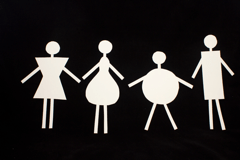Improve Your Relationships With This One Secret

Are you looking for a better way to interact with a certain someone in your life, or people in general? Does someone you deal with regularly have a behavior that you just can’t figure out, and you wonder what in the world is motivating their actions?
One of the greatest tools I can arm my students with is the knowledge of character types, or characterology, an amazing way to improve all your relationships. Seriously, this information is going to change your life.
Awareness Is the First Step
Characterology, or the study of character and body types, is a practical way of looking at other people that will illuminate their behaviors and motivations. With this deepened perception of others’ tendencies, you will be able to figure out the most effective way to deal with them in all kinds of situations. As an added benefit, once you have mastered using this tool to observe others, you can use it to examine your own patterns of thinking and behaviors and open up new levels of self-awareness, an essential component of spiritual advancement.
As a spiritual teacher and energy healer, I can tell you that all spiritual progress is born out of awareness. That’s why a daily meditation practice, staying in touch with your emotions, and taking healing courses to clear your chakras are all necessary elements in any spiritual journey. I am always guiding my students towards methods to increase their awareness, and understanding character structures is an excellent one.
The Link Between Trauma and Body Shape
In the last century, there have been many discoveries about the ways thought, behavior, physical body structures, energy fields, chakras, and illnesses are all interconnected. Practitioners of energy medicine and psychologists have independently identified some of the links, and, of course the ancients knew this without the need for studies, but it was Austrian psychiatrist Wilhelm Reich who first posited that childhood traumas, and the defenses created in response to those traumas, can actually affect the shape of your body.

Reich realized that many of his patients who had grown up with similar situations tended to develop similar body types, and patients who had similar body types tended to also have similar psychological patterns. He noted that people seemed to fit into five categories, which he named using terms that were popular for psychological discourse in his day: Schizoid, Oral, Psychopath, Masochist, and Rigid.
Don’t be worried by these dramatic names, and rest assured that they are not literal! If you (or someone you know) is a Psychopath in this character structure system, it does not mean you are really psychopathic!
Energy Field Distortions Create Physical Distortions
These character types are essentially defense mechanisms created as responses to traumas in your childhood. When a child experiences a trauma, they often block or repress their feelings. When the emotions are suppressed instead of expressed, they create a structure or system that allows for the child to deal with the world more easily. This defense pattern is designed to keep the child “safe,” though that safety is a façade because the defense itself perpetuates the behavior-response model it seeks to avoid. When this method of response to the world becomes habitual, it affects the structure of that person’s energy field and consequently, their physical body.
One of the tenets of energy healing is that your body is made from the energy in your personal field. When the energy field is sick, the body becomes sick, too, and when you heal your energy field, you can heal the body. It would make sense then, that a persistent distortion in your energy field could cause a distortion in your physical shape, and that similar distortions in different people caused by similar traumas would create similar body types.
Each of the five character types is formed at a specific developmental age from a specific type of trauma, and each has its own set of issues and goals, mottos and physical builds. Here is just a glimpse of the wealth of insight characterology provides.

1. The Schizoid
The schizoid feels unsafe and often tries to disconnect from the physical world. This internal struggle can manifest as a seemingly disconnected physical body, including weak joints. Schizoids are often tall and thin and some have twisted spines and/or asymmetrical or lopsided features or limbs.
2. The Oral
The Oral feels deprived. Often they feel an inner emptiness that they are constantly trying to fill. They are terrified of rejection and abandonment and are prone to depression and fatigue. The Oral’s physical form appears sluggish, with weak legs, hunched shoulders, and flaccid muscles. The Oral body tires quickly and may have low metabolism.
3. The Psychopath
The Psychopath feels betrayed, and has difficulty trusting anyone. The psychopath responds with aggression toward the world, often disguised, and this character type can be attractive and charming with compelling eyes. Watch for the slump of an overburdened soul, and back or joint problems to identify a Psychopath. Heart issues can also be a concern.
4. The Masochist
The Masochist feels trapped and defeated, unable to express their true self. They hold everything inside which fuels their anger, and as a result, their energy field becomes inflated. This energy pattern creates a heavy and compact body with big muscles and a short neck.
5. Rigid
Rigids fear vulnerability and are determined to squash their true self as a result of that self being rejected in early childhood. This constant “keeping up appearances” mode creates a stiff posture with a straight and erect backbone and a head held high.

Character types are so much more complex and multi-dimensional than I can cover in a blog post, but I hope this brief overview has given you a taste of how helpful this information can be in deciphering other people’s actions and becoming more aware of your own behavior or feelings. When you grasp character structures, you can begin to predict actions and responses from others, and learn the best approach to take with different types to improve every single one of your relationships, including with yourself.
I discuss each of these character types in much more detail and show you how to apply this knowledge to improve your day-to-day relationships in my current LifeForce Energy Healing® I Online Course, which is a twelve week program designed to teach you how to heal yourself and others, and certifies you in the exciting field of energy medicine!

